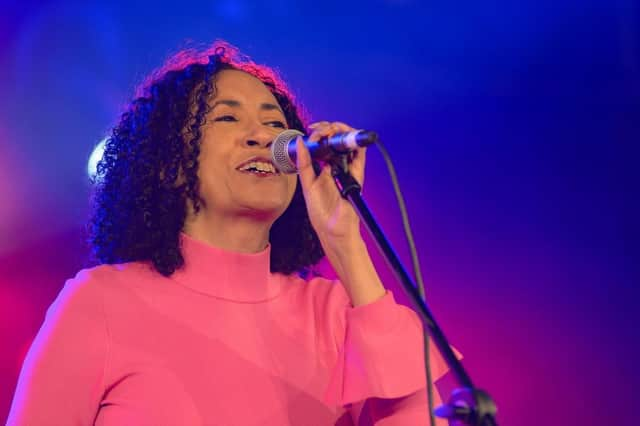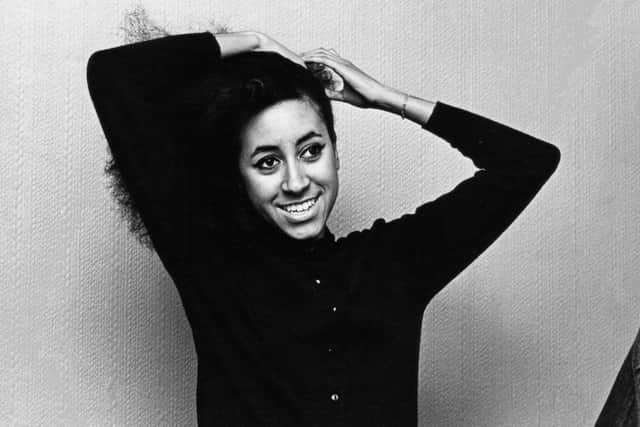Rhoda Dakar: ‘I have a strong and enduring attachment to anti-racism’


“We rehearsed last night and it sounded great and I came out there thinking, ‘Well, there was almost no need for that, everyone else was fine’,” she says breezily.
As a patron of the Music Venue Trust, the former lead singer with 2 Tone band The Bodysnatchers is appreciative of all that grassroots venues, such as the ones she is playing at on this tour, have been through over the past two years.
Advertisement
Hide AdAdvertisement
Hide Ad“Because of the model they’re run on, they rely on people coming in,” she says. “They’ve had a bit of money to keep them going but there’s no grant money generally available. Small venues are run for the love of music and for the love of doing it, so the more love that we can show back to them, it’s really important.”
Having recently signed to Sunday Best, the label founded by DJ Rob Da Bank and run by Sarah Bolshi, Dakar has just released a reggae version of David Bowie’s The Man Who Sold The World as the second of five singles from her forthcoming album. An avid Bowie fan, she says and her band had been “tearing (their) hair out” puzzling over which of his songs they could “do justice to” and make their own.
“When we were looking around we actually found a contemporary version of The Man Who Sold The World and musically it was great but the vocal just wasn’t there, it lacked commitment. I thought ‘I know I can do a better version than that’, so we thought we’d do our own. We didn’t copy the previous version, we did our own reggae version, but also just made sure that the vocal was committed and that already makes a massive difference.”
Serendipitously the single features Marley Drummond, great-grandson of Don Drummond, trombonist with 60s Jamaican ska legends The Skatalites, who taught Rico Rodriguez who Dakar worked with in Jerry Dammers’ post-Specials group, The Special AKA.
Advertisement
Hide AdAdvertisement
Hide Ad“I only found out (the connection) last month, I’d been working with him for over a year and he just happened to mention it,” Dakar says. “He said it to our sax player Terry (Edwards) and Terry has played with Rico. Marley’s great-grandad taught Rico and Rico has played with us and now Marley’s playing with us. It’s all wheels within wheels.”


Dakar’s covers album will be released in the autumn. The idea for the record began, she says, during lockdown when she found herself listening to The Pretenders’ rendition of the Morrissey song Everyday is Like Sunday. “It was like an earworm,” she says. “This was at the point when we were all looking out of the window thinking ‘what day is it?’ There genuinely was the feeling that every day was the same at the beginning of the pandemic. That’s when I thought ‘we should record this’. When there was a ‘weather permitting’ day we went in and recorded it.”
The artwork for the singles have all been designed by the Sheffield artist Pete McKee, of whom Dakar is a big admirer. “I really love his work,” she says. “In fact, the last time my band played in Sheffield I made everyone go to his gallery and they all had to spend at least an hour walking round, whether they liked it or not.”
It’s now 43 years since Dakar joined 2 Tone band The Bodysnatchers as lead vocalist. “I was the last one in,” she says, recalling how she had been part of London’s punk scene in the late 1970s. “If it wasn’t for the punk scene, I wouldn’t have joined that band. Shane MacGowan (then frontman of The Nips before forming The Pogues) introduced me to Nicky (Summers), who had put the band together, and obviously nobody would have known Shane if it hadn’t been for punk.”
Advertisement
Hide AdAdvertisement
Hide AdShe believes the 2 Tone ska movement continues to resonate today because it had “a strong identity musically, politically and visually”.
“Honestly, as with any music that draws you in, you makes friends around it,” she adds. “I did that with Bowie, certainly, back in the day. I’m still firm friends with some of the people I met outside gigs. Loads of us had turned up to sneak into Roxy Music’s gig at the Rainbow because we didn’t have tickets, this was in November ’73. We’d all seen Bowie and we all met outside Roxy Music, we just started chatting because we’d all tried to sneak in and all failed. Of those people I know where all of them are now. There’s only one I haven’t spoken to, and that’s more because we fell out, but I know where she is and I know she’s OK.
“Bizarrely, on that very night Paul Cook and Steve Jones from the (Sex) Pistols tried to sneak into that very same gig and they got in. They’ve never been forgiven.”
Dakar still feels a strong affinity with the politics of her younger years. “I have a strong and enduring attachment to anti-racism and left-wing politics in general,” she says. “I’m still a lefty, I’m proud to say, and still happy to work towards those ends because nobody’s going to give you something unless you go after it. Today we have a Tube strike in London, and good for them. People are threatening their pensions and the Government is saying ‘we’ll support TfL (Transport for London) to continue running the service, because they have lost a lot of revenue in the last couple of years, but you’ll have to continue trimming the pensions of the Tube workers’. How dare they? That’s just so typical. Do they trim their own pensions? No, they don’t, they just award themselves bigger ones.”
Advertisement
Hide AdAdvertisement
Hide AdIn the mid-80s Dakar worked with Jerry Dammers in The Special AKA, most famously on their singles (Free) Nelson Mandela and The Boiler. The latter, a harrowing song about a woman with low self-esteem who is raped and assaulted, was originally written for The Bodysnatchers. She believes it is important that music continues to ask difficult questions. “Music has been used to pass down ideas and history in cultures that don’t have writing, it grew alongside oral tradition, so of course it has to tell all kinds of stories,” she says. “It’s perfectly reasonable to sing about love or something great that happened to you, but equally it’s really important to document the rest of your life or things that you want to change. Of course it’s vital that carries on.”
After The Special AKA’s one and only album, In The Studio, Dakar left music altogether for 20 years. “I think everyone who had been in that band ran screaming, it was unbearable,” she says. “It was a horrible time and I don’t think anyone came out of it very well.” It was not until 2007 that she was coaxed back into a studio by friends; even then, she says: “It was very hard to go back.”
Thankfully nowadays social media and the live circuit has brought her back in touch with many of the musicians she worked with during the 2 Tone era, including Horace Panter and Lynval Golding from the Specials and Pauline Black from The Selecter. She says she also sees members of Madness in London. “I’m in touch with a lot of people from that era because I see them around, I play gigs with them, tour with them. Even Dave (Wakeling) from The English Beat. I’ve seen a lot of them,” she says.
Rhoda Dakar plays at Sally Browns in Bradford on Friday March 11. facebook.com/rhodadakarofficial
Comment Guidelines
National World encourages reader discussion on our stories. User feedback, insights and back-and-forth exchanges add a rich layer of context to reporting. Please review our Community Guidelines before commenting.